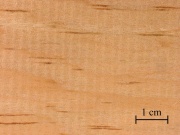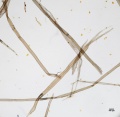Difference between revisions of "Sugar pine"
| (2 intermediate revisions by the same user not shown) | |||
| Line 1: | Line 1: | ||
| − | [[File:19_SugarPine.jpg|thumb|Sugar Pine | + | [[File:Sugar_Pine.jpg|thumb|Sugar Pine (''Pinus lambertiana'')]] |
| − | + | [[File:19_SugarPine.jpg|thumb|Sugar Pine (''Pinus lambertiana'')]] | |
| − | (''Pinus lambertiana'')]] | ||
== Description == | == Description == | ||
| − | A tall, evergreen tree, ''Pinus lambertiana'', native to the Pacific coast of North America. Sugar pines grow straight and tall to heights typically over 100 feet. Thus, each tree can produce significant amounts of high quality | + | A tall, evergreen tree, ''Pinus lambertiana'', native to the Pacific coast of North America. Sugar pines grow straight and tall to heights typically over 100 feet. Thus, each tree can produce significant amounts of high quality lumber. Sugar pine has a soft, pale color wood with a straight grain and smooth texture. It is used for carvings, piano keys, organs, millwork, shingles, and lumber. |
== Synonyms and Related Terms == | == Synonyms and Related Terms == | ||
| − | Pinus lambertiana | + | ''Pinus lambertiana'' |
| − | == Chemical | + | == Physical and Chemical Properties == |
Paper fiber type: softwood, soft pine. Using transmitted light microscopy, fibers are identified by the presence of egg-shaped fenestriform pits 2-3 across the fiber. Pits are uniform in size and occur mostly commonly in groups of two. Appearance with [[Graff "C" stain]]: varies with pulping and bleaching. Ray tracheids are non-dentate. Average dimensions of fibers: length 5.9mm, width 40-50μm. Common pulping method: Common pulping method: [[kraft process|kraft]] and [[sulfite process|sulfite]]. | Paper fiber type: softwood, soft pine. Using transmitted light microscopy, fibers are identified by the presence of egg-shaped fenestriform pits 2-3 across the fiber. Pits are uniform in size and occur mostly commonly in groups of two. Appearance with [[Graff "C" stain]]: varies with pulping and bleaching. Ray tracheids are non-dentate. Average dimensions of fibers: length 5.9mm, width 40-50μm. Common pulping method: Common pulping method: [[kraft process|kraft]] and [[sulfite process|sulfite]]. | ||
| Line 19: | Line 18: | ||
</gallery> | </gallery> | ||
| − | == | + | ==Resources and Citations== |
| + | * The Wood Database: [https://www.wood-database.com/sugar-pine/ Sugar Pine] | ||
| + | |||
| + | * Wikipedia: https://en.wikipedia.org/wiki/Pinus_lambertiana (Accessed October 13, 2020) | ||
* ''Dictionary of Building Preservation'', Ward Bucher, ed., John Wiley & Sons, Inc., New York City, 1996 | * ''Dictionary of Building Preservation'', Ward Bucher, ed., John Wiley & Sons, Inc., New York City, 1996 | ||
| − | * | + | * Western Pine Association, Portland Oregon: air-dry weight = 25 pcf |
* ''The American Heritage Dictionary'' or ''Encarta'', via Microsoft Bookshelf 98, Microsoft Corp., 1998 | * ''The American Heritage Dictionary'' or ''Encarta'', via Microsoft Bookshelf 98, Microsoft Corp., 1998 | ||
Latest revision as of 13:48, 28 September 2022
Description
A tall, evergreen tree, Pinus lambertiana, native to the Pacific coast of North America. Sugar pines grow straight and tall to heights typically over 100 feet. Thus, each tree can produce significant amounts of high quality lumber. Sugar pine has a soft, pale color wood with a straight grain and smooth texture. It is used for carvings, piano keys, organs, millwork, shingles, and lumber.
Synonyms and Related Terms
Pinus lambertiana
Physical and Chemical Properties
Paper fiber type: softwood, soft pine. Using transmitted light microscopy, fibers are identified by the presence of egg-shaped fenestriform pits 2-3 across the fiber. Pits are uniform in size and occur mostly commonly in groups of two. Appearance with Graff "C" stain: varies with pulping and bleaching. Ray tracheids are non-dentate. Average dimensions of fibers: length 5.9mm, width 40-50μm. Common pulping method: Common pulping method: kraft and sulfite.
Additional Images
Resources and Citations
- The Wood Database: Sugar Pine
- Wikipedia: https://en.wikipedia.org/wiki/Pinus_lambertiana (Accessed October 13, 2020)
- Dictionary of Building Preservation, Ward Bucher, ed., John Wiley & Sons, Inc., New York City, 1996
- Western Pine Association, Portland Oregon: air-dry weight = 25 pcf
- The American Heritage Dictionary or Encarta, via Microsoft Bookshelf 98, Microsoft Corp., 1998
- Marja-Sisko Ilvessalo-Pfäffli. Fiber Atlas: Identification of Papermaking Fibers (Springer Series in Wood Science). Springer, 1995.
- Walter Rantanen. "Fiber ID Course." Integrated Paper Services. June 2013. Lecture.



